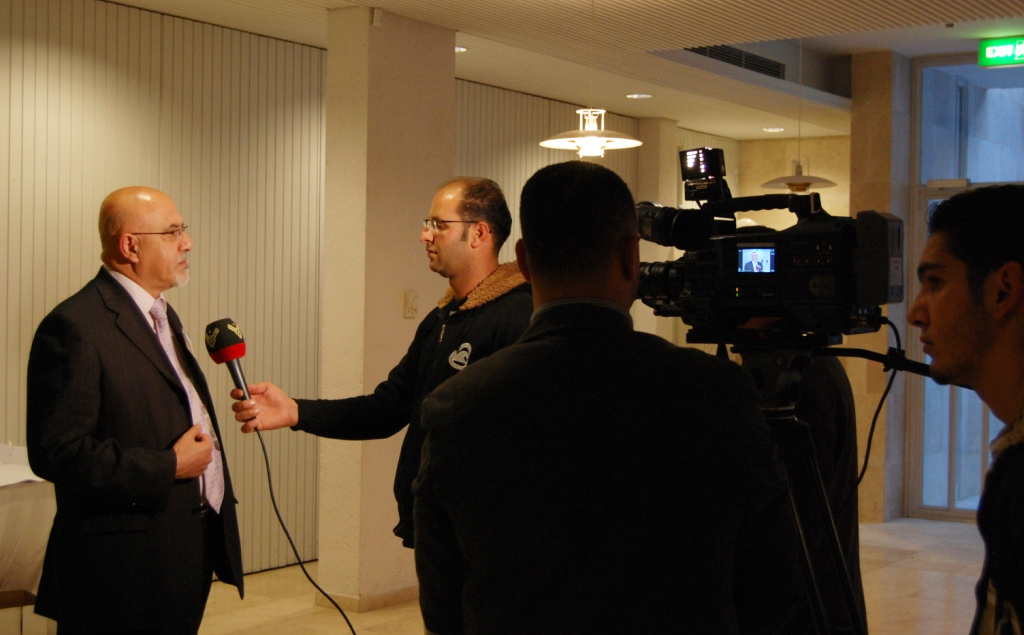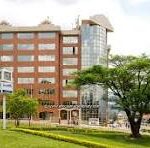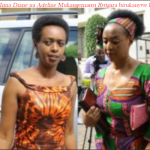Christians Who Demonize Israel: Kairos by Denis MacEoin

- “Christian children are massacred, and everything is done in plain sight. Islamists proclaim on a daily basis that they will not stop until Christianity is wiped off the face of the earth. So are the world Christian bodies denouncing the Islamic forces for the ethnic cleansing, genocide and historic demographic-religious revolution their brethren are suffering? No. Christians these days are busy targeting the Israeli Jews.” — Giulio Meotti, Italian journalist.
- The Kairos document seems to be so egregiously discriminatory that in 2010, the Central Conference of American Rabbis (CCAR) declared it “supersessionist” and “anti-Semitic.”
- We must ask why a presentation of the work of Kairos in an Anglican church made no reference whatever to the many associations with extremism and denial of a more rational Christian approach to the problems faced by Palestinian Christians.
Last September, during the World Week for Peace in Palestine Israel — an initiative of the Palestine Israel Ecumenical Forum (PIEF) of the World Council of Churches, St. Thomas’ Church in Newcastle upon Tyne, UK, hosted an event titled “Wall Will Fall”.
For anyone unfamiliar with the history, legal issues, and distortions of the Israeli-Arab and Jewish-Muslim conflicts, the deeply one-sided presentations and literature of the event may seem reasonable in the lack of such a context, and this report will, therefore, attempt to rebalance the narrative.
There are, broadly speaking, two clashing narratives about historical and current events in the region. By presenting only one side of the conflict, Wall Will Fall served only to exacerbate the root cause for the failure of peace negotiations: Palestinian rejection of the two state solution. Although Israel was repeatedly condemned — often very harshly — for its treatment of Palestinians, not once in the presentations or in the literature available were the Arabs ever censured for their series of aggressive wars against Israel, or the Palestinians criticized for their decades of terrorist attacks on Israelis, their preaching of anti-Semitic hatred in school textbooks, mosque sermons, summer camps, government-controlled media, and elsewhere. During the event, guilt was placed on one party only: Israel. As we shall argue, Israel is the least likely candidate for censure at such a high level.
Kairos
There were two workshops. One was a PowerPoint presentation and commentary by a local leader of Kairos Britain, an organization based on the much-criticized document, Kairos Palestine. The Kairos document seems to be so egregiously discriminatory that in 2010, the Central Conference of American Rabbis (CCAR) declared the statement “supersessionist” and “anti-Semitic.” Since the Kairos session and literature associated with it were a core feature of the event, I will analyse the very real and dangerous implications of its support by Christians.
The Kairos Palestine venture was presented as the work of supposedly all Palestine Christians, but it was and is an extremely radical position adopted by a relatively small number of churches and individuals. In 2010, the politically balanced Christians for Fair Witness on the Middle East, an organization of Protestants and Catholics in North America, wrote a detailed critique entitled “Cautions to U.S. Churches Regarding the Kairos Palestine Document.” It was endorsed by St. Paul University’s Institute for Jewish-Catholic Relations, and by Dialogika (as is made clear on the Christians for Fair Witness website). While treating the Kairos document with respect, the cautions expressed were far-ranging and crucial.
The Cautions document begins by saying that “U.S. Churches cannot adopt this narrative without bringing a critical eye and ear to bear upon it and without similarly listening to an Israeli narrative which also has its truth.” That sort of critical eye and openness to an Israeli narrative was wholly absent from the workshop session I attended. The Cautions document continues: “The Kairos Palestine document states that ‘[the Palestinian] connectedness to this land is a natural right.’ (Sec. 2.3.4) We agree . . . But the Jewish connection to the land is also a natural right. Both Jews and Palestinians have legitimate claims to the land, which can and must be accommodated through a negotiated two-state solution.”
That Jewish natural right was not once raised during the Wall will Fall presentation. Only Palestinian rights and demands were considered of relevance to Christians.
The Cautions document also states: “The Kairos Palestine document professes that ‘an end to Israeli occupation… will guarantee security and peace for all.’ (Sec. 7) … But is that true? There was no security or peace prior to the occupation.” This analysis continues with a list of Arab violence against Jews, the PLO’s 1964 objective of liquidating Israel, and a clear statement that “There is no reason to believe that ending the occupation alone would bring security and peace to Israel and Palestine.”
That this is empirically correct should be clear from the fact that, although Israel pulled out of the Gaza Strip completely in 2005, the take-over of Gaza by Hamas has led to endless rocket attacks and other provocations. These have caused three wars and the enforcement of tight security to prevent Hamas terrorists from entering Israel to attack civilians. Security and peace?
The Cautions document continues by citing repeated Israeli peace endeavours and their rejection by Palestinian leaders: they are in direct contradiction to the way the Kairos document places the blame for a lack of peace squarely on Israel alone. In an appendix added some days later, Christians for Fair Witness cited another article:
“The Kairos Palestine document speaks of a ‘reality on the ground’ that is dominated by Palestinian suffering under war and the Israeli occupation. (Sec. 1) Our churches must understand this suffering”.
And Christians for Fair Witness commented thus:
“But the document is silent with regard to another dominant reality on the ground — Israeli suffering under terrorism and decades of wars waged against it by virtually all of its neighbors. Our churches must understand this history and this suffering as well.”
The presentation at the Wall will Fall event appears to have deliberately and consistently ignored all discussion of the suffering to which the people of Israel have been exposed.
The Kairos Palestine document, elevated at the event as an outstanding moral appeal, also presents statements such as this:
“The West sought to make amends for what Jews had endured in the countries of Europe, but it made amends on our account and in our land. They tried to correct an injustice and the result was a new injustice.”
The suffering of the Jewish people goes back two thousand years. Persecution of Jews in Europe had parallels in Islamic countries, even though these remained at the level of massacres rather than genocide. But Israel was not a response to the Holocaust, even if it played a role in the creation of a Jewish state. This pinning of blame on Europeans and Jews displays a distinctly un-Christian response to the Jewish diaspora and the millennial yearning to return home.
Kairos further reads:
“We also declare that the Israeli occupation of Palestinian land is a sin against God and humanity because it deprives the Palestinians of their basic human rights, bestowed by God.”
This says nothing about the basic human rights of the Jewish people, rights trampled on and scorned for two millennia, or that the Jewish people in Israel are affording the Arabs living there more rights than they would get in any Arab country. It also ignores the reasons for the so-called occupation, a response to an aggressive war of elimination waged against Israel in 1967 by five Arab nations, supported by nine Muslim states. The Arab League compounded Israel’s security problems when it declared in its infamous Khartoum Resolution just after the war: “no peace with Israel, no recognition of Israel, no negotiations with it…”
Should Christians not be concerned by the following statement in the Kairos Palestine document:
“The Palestinian people… also engaged in peaceful struggle, especially during the first intifada.”
The words “peaceful struggle” surely stick in one’s throat. During the first four years of the intifada, more than 3,600 Molotov cocktail attacks, 100 hand-grenade attacks and 600 assaults with guns or explosives were reported by the Israel Defense Forces. The violence was directed at civilians and soldiers alike. During this period, 16 Israeli civilians and 11 soldiers were killed by Palestinians in the territories; more than 1,400 Israeli civilians and 1,700 Israeli soldiers were injured. Approximately 1,100 Palestinians were killed in clashes with Israeli troops. And Palestinians were stabbed, hacked with axes, shot, clubbed and burned with acid, not by Israelis but by Palestinian death squads.
At this juncture, it may be worth quoting recent remarks by the Italian journalist Giulio Meotti, who has written widely about Christian attitudes to Israel:
“Christianity is dying in Syria and Iraq. Christian churches are demolished, Christian crosses are burned and replaced with flags of the Islamic State, Christian houses are destroyed, entire Christian communities are displaced, Christian children are massacred, and everything is done in plain sight. Islamists proclaim on a daily basis that they will not stop until Christianity is wiped off the face of the earth. So are the world Christian bodies denouncing the Islamic forces for the ethnic cleansing, genocide and historic demographic-religious revolution their brethren are suffering? No. Christians these days are busy targeting the Israeli Jews.”
There are other reasons to believe that the Kairos document and the Christians who support it are a cause for concern to those churchmen and women who seek a nuanced and balanced Christian understanding of this conflict.
Among the authors of the document were Archbishop Atallah Hanna, Michael Sabbah, Rev. Mitri Raheb, Rev. Naim Ateek and Father Jamal Khader. The coordinator and the spokesperson of the Kairos group is Rifat Odeh Kassis. There is no time to look at all of these individuals, but it will be worthwhile to mention a few. In the view of many, their virulent anti-Israel rhetoric equates with anti-Semitism within the definitions used by Kenneth Marcus[1] and most other modern authorities, including the International Working Definition and the US State Department Definition. It is alarming that some Christians would support them at all.
The first mentioned, Theodosias Atallah Hanna, was the Archbishop of Sebastia from the Orthodox Patriarchate of Jerusalem and a former spokesman of the Orthodox Church of Jerusalem and the Holy Land. He called for the creation of an Islamic-Christian union that would foil the “American offensive” against Iraq and “release Palestine from the river to the sea” (which would entail the elimination of Israel). “The suicide bombers who carry out their activities in the name of religion are national heroes and we’re proud of them,” he has allegedly said, according to the ASSIST News Service. He also said, in a speech in Dubai, “Some freedom fighters adopt martyrdom or suicide bombing, while others opt for other measures. But all these struggles serve the continued intifada for freedom. Therefore, we support all these causes.” (This is according to a Jerusalem Post report based on a police investigation.) Although Hanna has denied support for suicide bombing, he seems simply to have redefined “suicide”: “The attackers do not commit suicide as several claim, nor do they carry out acts of terrorism as others claim, for they are fighters against occupation,” Hanna added in his message, which came after 22 people were murdered that same month in Israel’s bloodiest suicide bombing in nearly a year. He ” not only continued to express support for suicide bombing but also for a Jew-free Palestinian state extending from the Jordan River to the Mediterranean Sea in remarks on three separate occasions during January 2003,” according to FrontPageMagazine. According to ArabicNews.com, the Greek Patriarch of Jerusalem, Arinous 1st, criticized Hanna and fired him as an official Orthodox spokesman for “supporting Palestinian terrorism.”
Michael Sabbah, former Archbishop and Latin Patriarch of Jerusalem (1987-2008) has been described by the Committee for Accuracy in Middle East Reporting in America (CAMERA) as an “anti-Israel polemicist” who encourages “resistance” (muqawwama) and intifada. In Palestinian Arabic parlance, “resistance,” although it can be peaceful, generally means the use of violence. It is enshrined in the full name of Hamas, Harakat al-Muqawwama al-Islamiyya (the Islamic Resistance Movement), which is a radical religious, political and military organization, not an international reconciliation forum. Here, as elsewhere, the Islamic character of “resistance” is central to the concept. Sabbah cannot be oblivious to this common understanding, yet he does not choose his words wisely when speaking of it. His own organization, the Society of St. Yves, has close ties to all the most politically extreme NGOs in the region. A co-founder and legal advisor, Linda Brayer, has accused Israel of “ethnic cleansing,” and alleged that the Israeli government views Palestinians as “not fully human,” likening Israeli law to “the kind of law they must have had in Germany in 1935.” These are two of the most poisonous anti-Semitic slurs used by anti-Israel activists.
Mitri Raheb is the pastor of the Evangelical Lutheran Christmas Church in Bethlehem. He has claimed that Israelis are “ethnically cleansing” Christians, but given that the Christian population of Israel is the Christian population in the Middle East to have grown solidly by over 1,000% since 1948, and given that the exodus of Christians from the West Bank and Gaza has been precipitated by extremist Muslims and the Palestinian authorities, Raheb’s claim has no basis and even seems pathological. The majority of Christians in the West Bank live in cities such as Nablus, Jericho and Ramallah, all of which are under Palestinian control. Before 1995, under Israeli auspices, Bethlehem’s Christian population grew by 57%. But under the Palestinian Authority since 1995, the number of Christians has plummeted. Palestinian gunmen seized Christian homes — compelling Israel to build a protective barrier between them and Jewish neighbourhoods — and then occupied the Church of the Nativity, looted it and used it as a latrine. Today, Christians comprise a mere one-fifth of their holy city’s population. In Gaza, most Christians have fled in fear of attacks from Hamas gunmen.
If there was ethnic cleansing of Palestinian Christians, it was under Muslim rule: two-thirds of Christian Arabs left the areas between 1949 and 1967, the period when Jordan occupied and annexed the West Bank, and Egypt controlled Gaza — years before Israel governed those areas. Raheb’s claim of “ethnic cleansing” is a blatantly elevated and false statement, yet his influence on the Kairos document was considerable. Israeli Arab Christians are on average more affluent than Israeli Jews and better-educated, even scoring higher on standardized tests. In the Palestinian territories, Christians are severely discriminated against.
According to a report by the Jerusalem Connection, an American Christian organization:
Ever since the Oslo Accords handed over control of large parts of Judea and Samaria to the Muslim Palestinian Authority, Christians in Bethlehem have been suffering many examples of intimidation, beatings, land theft, firebombing of churches and other Christian institutions, denial of employment, economic boycotts, torture, kidnapping, forced marriage, sexual harassment, and extortion documented by Justus Reid Weiner of Hebrew University.
PA officials are reportedly directly responsible for many of the attacks, and some Muslims who have converted to Christianity have been murdered. The Christian population went from a 60 percent majority in 1990 to a 40 percent minority in 2000, to about 15 percent of the city’s total population today, according to Weiner.
In a recent Op-Ed piece in the Wall Street Journal, former Israeli ambassador to the US, Michael Oren, wrote that “As 800,000 Jews were once expelled from Arab countries, so are Christians being forced from lands they’ve inhabited for centuries” throughout the Middle East. Citing statistics, Oren wrote that Ramallah was 90% Christian before the 1947-48 War of Independence, and Bethlehem was 80% Christian. Today Ramallah is a large Islamic city and Bethlehem’s Christians are near extinction.
Why were none of these facts presented as balance for an informed discussion among Christians presented in this workshop? Why was everyone instead subjected to a single-minded and patently false claim that Israel is responsible for all the bad things that happen to Christians in the West Bank and Gaza?
Father Jamal Khader, of the Latin Patriarchate in Jerusalem, has been the object of considerable criticism from other Catholics in the region. He has engaged in bitter argument with them. He is associated with Sabeel, a supersessionist and arguably anti-Semitic organization[2] that has been criticized within the Church of England, and about which we shall say more.
Finally, we should mention Rifat Odeh Kassis, a co-author of the Kairos document and its overall coordinator and spokesman. Kassis is the director and founder of Defence for Children International – Palestine. One of his board members is Shahwan Jabarin, a prosecuted member of a major terror organization, the Popular Front for the Liberation of Palestine (PFLP), which has been responsible for the murders of large numbers of Israeli civilians, including many children. It has been described as a terrorist organization by the USA, Canada, and the European Union. It was the first terrorist organization to hijack international airplanes. That a confessed Christian is willing to tolerate the presence of a PFLP operative on the board of an NGO he has founded is disturbing to say the least.

Rifat Odeh Kassis, co-author and general coordinator of the Kairos Palestine initiative, is pictured above giving an interview to Al-Manar TV, the official TV channel of Lebanon’s Hezbollah terrorist organization. (Photo source: Kairos Palestine) |
Kassis made a public attack on then Archbishop of Canterbury, Rowan Williams, following Williams’s 2011 interview, in which he expressed anxiety about the expulsion of Christians from the Middle East and referred to a situation akin to ethnic cleansing of Christians from the West Bank. In his refutation of Williams, Kassis defended extremist Muslims, claiming that Israel, not radical Islamists, had caused the flight of Christians, while ignoring the simple fact that Christians do not flee from Israel. In the same response, Kassis expressed antagonism to church leaders in general:
“We are no longer expecting support from church leaders around the world. Our Hope, Faith and Love come from elsewhere. However, at the same time, we request you and every leader, especially church leaders, not to use us and our cause for your own purposes. We are so thankful to Your Grace for the ‘International Conference on Christians in the Holy Land’ that you are holding in your Palace in July, but we feel it will be useless, not to say harmful to us, indigenous Christians in the land of the Holy One, if the outcome will be in the same spirit as your interview.”
We must ask why a presentation of the work of Kairos in an Anglican church made no reference whatever to these many associations with extremism and denial of a more rational Christian approach to the problems faced by Palestinian Christians. Attempts to query statements made during the presentation were blocked by the speaker.
Dr. Denis MacEoin has lectured and written about the Middle East since the 1980s
[1] The Definition of Anti-Semitism, Cambridge University Press, 2015
[2] See the following:
- Shelley Neese. “Palestinian Liberation Theology”, FrontPage Magazine, April 20, 2007.
- Dina Applebaum. “The Anti-Semitism of the Presbyterian Church, USA”, The American Thinker, March 24, 2006.
- “Chicago Tribune Public Editor Lauds Sabeel”, Committee for Accuracy in Middle East Reporting in America, October 25, 2005.
-
- Roberta P. Seid, Director of Research and Education and Roz Rothstein, Executive Director, StandWithUs. Interfaith Dialogue, Letters, The Jewish Journal of Greater Los Angeles, 2005-12-09.
- Avi Beker. “Guardians of the fence”, Haaretz, August 28, 2005.
- Melanie Phillips. “Peace on earth, but hatred towards Israel”, melaniephillips.com, December 18, 2006.
- Brigitte Gabriel. “Canada’s Unholy Alliance”, FrontPage Magazine, November 7, 2005.
- Ron Csillag. “Conference on divesting in Israel cause of concern”, Canadian Jewish News, October 27, 2005.
- Gerald M. Steinberg. Cut the cash, end the hostility, Jerusalem Post, April 20, 2006.
























